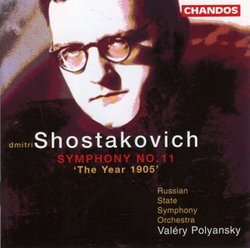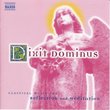| All Artists: Dmitry Shostakovich, Valery Polyansky, Russian Symphony Orchestra Title: Dmitri Shostakovich: Symphony No. 11 Members Wishing: 0 Total Copies: 0 Label: Chandos Release Date: 9/24/1996 Genre: Classical Styles: Historical Periods, Modern, 20th, & 21st Century, Symphonies Number of Discs: 1 SwapaCD Credits: 1 UPC: 095115947623 |
Search - Dmitry Shostakovich, Valery Polyansky, Russian Symphony Orchestra :: Dmitri Shostakovich: Symphony No. 11
 | Dmitry Shostakovich, Valery Polyansky, Russian Symphony Orchestra Dmitri Shostakovich: Symphony No. 11 Genre: Classical
|
Larger Image |
CD DetailsSimilar CDs |
CD ReviewsHow disappointing.... rogue63 | 04/24/2001 (3 out of 5 stars) "This fine work, recorded by an OK orchestra, is marred beyond any sensible enjoyment by some terrible engineering. As you turn up the volume, as is necessary in order to hear the quieter parts well (Mistake No. 1), a high-pitched whine grows louder and louder, until it competes with and covers up the sound of the orchestra (Mistake No. 2). That terrible annoyance aside, the performance just isn't that great. A weak percussion section leaves the driving parts of the work rather bland, and sloppy string entrances and exits just bore the listener after a while, rather than continually sharpening your focus, like Shostakovich does at his best. This CD is simply a bad recording; don't buy it. Try Haitink or Stokowski, but stay away from this." The Most Cinematic Account of the Great 11th R. Kopp | New York, New York United States | 08/09/2009 (5 out of 5 stars) "Shostakovich's programmatic 11th, detailing the massacre of anti-Tsarist protesters in St. Peterburg's Palace Square on January 9, 1905, is among his greatest masterpieces (though it's been unaccountably underrated in some quarters). If you give credence to Shostakovich's unofficial biographer, Solomon Volkov (as I do), this symphony makes equal sense as a coded subversive protest against Stalin's repressive and murderous regime.
I bought this CD on the strength of a review that appeared in the American Record Guide for March/April 1997 (an issue dedicated to an overview of all of Shostakovich's recordings, by the way). Godell (sorry, I don't know his or her first name) proclaimed it "a monumental new recording of a 20th Century masterwork. Polyansky proves himself to be an outstanding dramatist, telling the tale of a fateful day in Russian history with an immediacy and and impact that are truly shattering." I couldn't agree more. He or she goes on to say that, "[w]ith his merciless attacks and pounding rhythms, Polyansky makes Stokowski's Houston version seem tame by comparison." It might seem preposterous to claim that anything Stokowski ever did was "tame"--I myself am a big fan--but Polyansky's version is uniquely gut-wrenching. Other conductors have brought their own brilliant musicality to this symphony--Rostropovich with the LSO (also excellent), Rozhdestvensky and Jarvi (in general, my two favorite Shostakovich conductors), Haitink, Stokowski, De Priest, Kondrashin and Barshai--all are angry, flowing, insightful. All are good, all worth hearing, but none capture the terrible human tragedy of this day in history quite like Polyansky. This Chandos version has all the visual force of the Odessa Steps sequence in Eisenstein's POTEMKIN, which is saying something. The only previous Amazon reviewer, "rogue63", complained about the engineering on this recording, citing a high-pitched whine. I'm mystified by this comment, since I hear no whine at any volume, with or without headphones. This recording DOES have an incredibly wide dynamic range, which fits Polyansky's interpretation to a T and is entirely appropriate for music that encompasses "an entire world," a la Mahler. The intimation of tragedy in the opening adagio sounds like a distant tune carried by the wind. You do have to strain your ears to hear it, but this is anything but a "mistake" in the engineering. I'm reminded of that old TV ad from way back: "When you want to capture someone's attention, . . . whisper!" Later, in the march of the allegro, when the troops descend on the the people, the volume is overwhelming, as it absolutely needs to be, and Polyansky's pacing is purposeful, relentless, merciless. "The hammering timpani at 14:30 are almost unbearably brutal," as Godell writes. "The close miking of the percussion adds immeasurably to the impact of these episodes." After the massacre, as we linger to survey the faces of the fallen, the music returns to its subtlest tones--a choked, stifled cry of despair that can barely escape the human breast. And then, at the close of the symphony, when bells ring out wildly in defiant hope, the volume returns with a vengeance: this might be the most exuberantly joyful moment in all of Shostakovich. An additional bonus to this issue are Eric Roseberry's helpful liner notes. He clues us in to the popular folk songs that Shostakovich quotes in the symphony and gives us significant snippets of the lyrics. As always with this allusive, sometimes elusive composer, this kind of background is most instructive. In sum: Polyansky's broad interpretation--nearly 20 minutes longer than Jarvi--lets us "see" the events as they unfold. He nails every beat. The recording employs a startling range of rapid shifts in tempo and dynamics that prevent it from ever being easy listening or background music. To my ears, quite simply definitive!" |

 Track Listings (4) - Disc #1
Track Listings (4) - Disc #1


